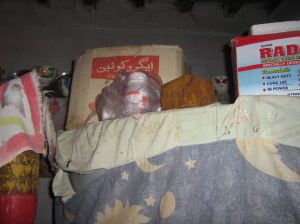According to a recent report by the Pakistan Agricultural Research Council (PARC), as many as 10,000 Pakistani farmers are poisoned annually by indiscriminate use of pesticides, and that is just in rural cotton growing areas. Chemical pesticides were first introduced into Pakistan in 1954 after a Locust outbreak, and since then, their use has increased dramatically. Agriculture also remains a large part of the economy in Pakistan. According to the Central Intelligence Agency (CIA) World Factbook, about 40% of Pakistan’s total population or nearly 80 million men and women are farmers.
The Prevalence of Pesticides in Pakistan
With so many people employed in the agriculture industry, the risk of exposure to toxics has greatly increased. Global Greengrants Fund grantee, Khoj Society for People’s Education used a $5,000 grant in 2009 to conduct a large survey of farmers and pesticide retailers to discover just how risky the situation has become. The study was a continuation of a 1992 survey by Pesticide Action Network (Global Advisor of Global Greengrants Fund) on the effects of pesticides on women in the Punjab Province.
The information they gathered is sobering.

According to their research, wheat and rice are staple crops in Pakistan, but to grow them, an average of 29 million kilograms of pesticides are imported every year, 14 times more than in neighboring India, which started using pesticides around the same time and continues to have high rates of pesticide use.
When they were first introduced, pesticides were given away and then subsidized at an ever-decreasing rate. Finally, the industry was privatized and since, the consumption of pesticides has reached an all-time high.
Their surveys found that high rates of illiteracy among Pakistani farmers exacerbate the problem. Farmers rely on the pesticide producers and retailers to inform them of any dangers and instruct them on proper use. Because of this reliance, they are also often unaware of alternatives to pesticide use. Unfortunately, this also means that many families are unaware of the hazards of improper storage or the necessity of wearing protective masks and clothing when spraying and mixing.
Khoj Society for People’s Education’s research found that pesticides are often stored in living rooms, among cookware and plates, and the bags in which they are sold are sometimes reused and sewn into quilts or floor covering. Utensils used to mix pesticides are often also used for cooking. They found that because women are not involved in the decision making around pesticide use and work both in the fields and in the home where pesticides are stored, they are at increased risk of poisoning.
Not only do families risk health issues from legal pesticide use, but illegal pesticides are also a problem, and therefore, a threat. Between 1989 and 1993, 22 pesticides were banned by the Pakistani government, but due to lack of enforcement, many of those pesticides, including DDT, are still available to purchase in Pakistan. The health consequences of these pesticides are often even more severe.
Effects of Pesticide Use:
Human Health:
|
Environment:
|
Educating Farmers
With the support of a small grant, Khoj Society for People’s Education was able to gather a lot of very useful information, but their work is not done. Clearly, one factor in reducing the amount of pesticides used in Pakistan is education; thus, the organization hopes to use their research to raise awareness among those working with or near pesticides.
With the help of Pesticide Action Network, they plan to work with farmers to have better management and monitoring practices in an effort to reduce pesticide use and dangers. Additionally, because they found women come into contact with pesticides in a more sustained manner, they hope to create a separate program for women to address concerns around their health.
